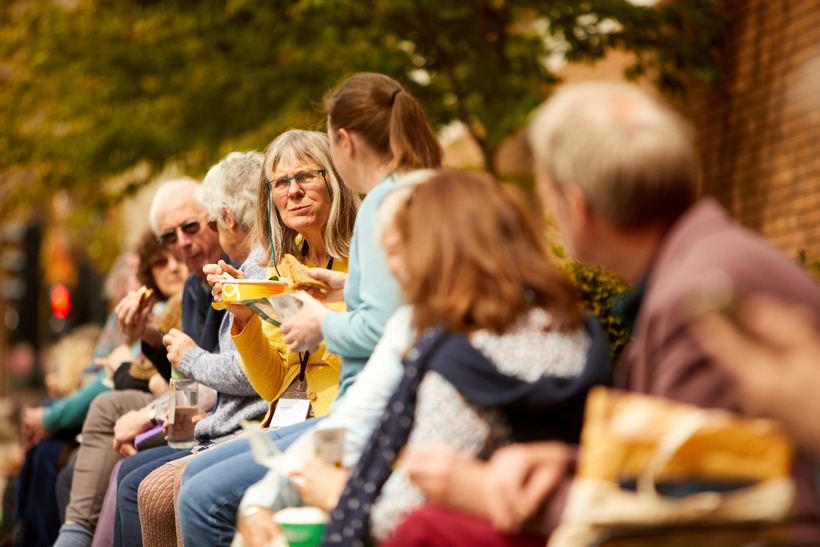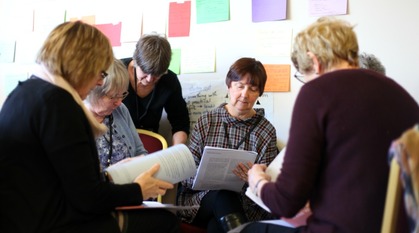Learning from other Yearly Meetings
Sarah Donaldson and Michael Booth discuss what they have learned from north American Friends about their structures in preparation for Yearly Meeting 2024.

In March 2024, Meeting for Sufferings endorsed a proposal for a continuing yearly meeting. This would meet four times a year and would be open to everyone, including children and young people.
We were reminded in ministry that the idea of a continuing Yearly Meeting isn't new or original to British Friends. We held meetings with Friends in north America in April and May to learn more about their governance structures.
Sarah: I remember when we first started talking about the possibility of holding Yearly Meeting sessions more than once a year someone mentioned that this already happens in other places. I don't know much about Quakers around the world so I was keen to find out more. You suggested talking with Friends from Baltimore, New York and Philadelphia to see how they hold their Yearly Meeting sessions – what made you think of that?
Michael: As secretary to Quaker World Relations Committee (QWRC), our Yearly Meeting committee that encourages British Friends to be aware that we are part of the worldwide community of Quakers, I have an ongoing interest in how other yearly meetings organise themselves, so I already knew. There's a lot of basic information on yearly meeting websites, including links to their equivalent of Quaker faith & practice but I could see we'd need to have a conversation with individual Friends to understand more about how things work.
Sarah: I was surprised to learn that Baltimore and New York have been holding continuing sessions since the 1950s. My idea that Yearly Meeting meets annually is very ingrained and I think I'd just assumed that was the traditional way, and anything different would be a recent innovation to cope with modern life. I suppose that's more like what's happened in Philadelphia, where the change is only about 15 years old. Talking to Friends with an understanding of both ways of meeting was especially helpful for me as it made me think about the potential consequences of change.
Michael: It was fascinating to learn how each yearly meeting has developed a structure that works for them. There is not a single structure that works for every yearly meeting, but we all need to be open to change to meet the situation we find ourselves in. I think that one of the strengths of Quakerism is the way that it has changed and evolved to meet the needs of each Quaker community. We owe a lot to early Friends for having set up structures that have not been set in stone.
Sarah: I agree – we're fortunate to have structures that can adapt to different circumstances. Maybe having a clear discipline helps that? All four yearly meetings share the discipline of respecting decisions made by gathered meetings we weren't a part of. Of course that isn't always easy and we could all think of situations where Friends had struggled to accept or even understand decisions that were made without them.
Michael: We can't really practice Quaker discernment without trust – our business method relies on us trusting that decisions made in meetings were made in right ordering, whether we were present or not. I have had the experience of being in a meeting where the feeling of the meeting has not been what I personally would have wanted. I had to let go of my own wishes and acknowledge that the clerks have been listening to the feeling of the meeting more carefully and successfully than me. And they were right!
Sarah: I think trust and accountability go together – in a lot of ways those nurture each other. When we have trust, we can ask difficult questions without it being personal and when we feel people are accountable then it's easier to trust them to get on with the things we've asked them to do. Generally people also appreciate as much involvement in a decision as is practical – advance notice if possible, and if not then time to digest what has been decided and why.
Michael: That makes me think of the American Quaker term 'seasoning' – meaning a period of waiting when action is not taken because it is not yet clear what the right way forward might be. We can season our business before it comes to Yearly Meeting, then we can take it to a Yearly Meeting session, and then if the meeting is not yet in unity we can take it away for further seasoning. 'Seasoning' is a way of testing a leading to be sure it is God's will, not our own will.
Having Yearly Meeting sessions more often should enable us as a yearly meeting to be more responsive. I know we have Meeting for Sufferings as well at the moment, but sometimes the way that Yearly Meeting minutes go to Meeting for Sufferings, who then eventually report back to Yearly Meeting makes it feel as if we are delaying taking action. I'm sure that's not intentional, it's just a consequence of our current structure.
Sarah: I agree. If we have more Yearly Meeting sessions then we can take more time if we need it. But we can also avoid issues going back and forth between different meetings, which can lead to confusion about whether decisions are final.
Michael: The other thing that interested me was how each yearly meeting recognised the importance of the relationship between the Yearly Meeting as a community and the various worshipping Quaker communities throughout their yearly meeting.
Sarah: Yes, and there were different ideas about how to promote connections between local Friends and the Yearly Meeting itself. Our conversations made me appreciate how area meeting representatives can help to keep Yearly Meeting and the centrally managed work on local agendas. If representatives get other Friends to see the point of attending Yearly Meeting for themselves then that could really help to bridge the gap that we often hear about.
Our thanks go to Baltimore, New York and Philadelphia Yearly Meetings for being so ready to meet with us – we enjoyed our conversations a lot.
Read the FAQ: Continuing our work on Quaker structures (PDF)


